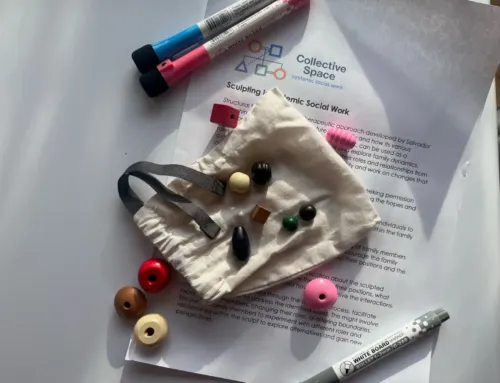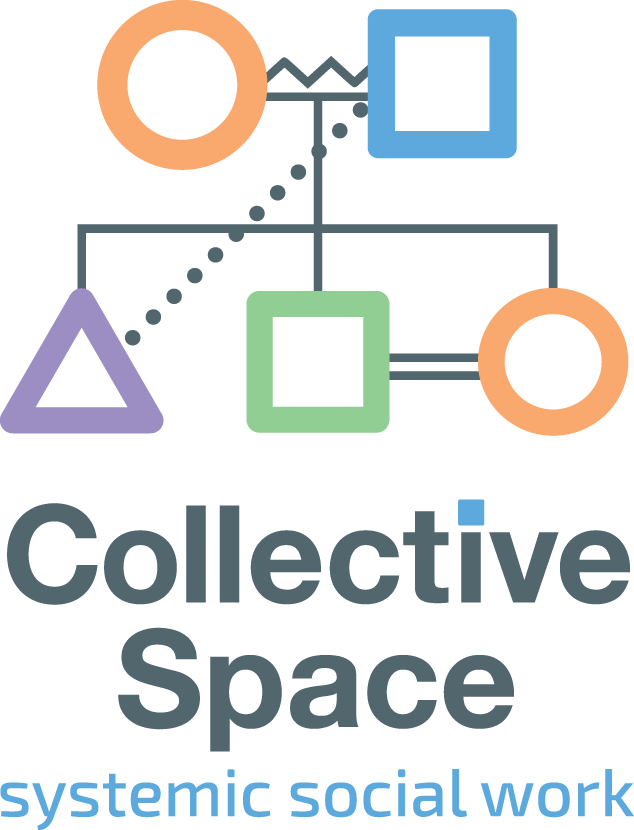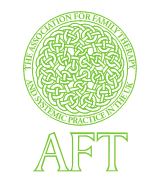Moments that sparkle in murky times
Moments that sparkle in murky times
The systemic concept of ‘sparkling moments’ comes from theory of Narrative Therapy developed by Michael White and David Epston in the 1970-80’s. When I first came across the term, I was a Local Authority social work manager undertaking my foundation year in systemic practice and I found the term far too woolly for the sharp end work I was engaged in. The alternative phrase that I came across was ‘unique outcome’ and this was the one I preferred; it seemed a better fit for a field that was often organised by KPI’s, goals and solutions. This was over a decade ago, and now as a social worker of 20 years and currently the director of a social work training organisation, I find myself, rather than waiting for an outcome, seeing the importance of looking out for ‘moments’ which happen all the time, can take you by surprise, have the capacity to energise and can be made every day.
I decided to launch Collective Space, because of the pivotal effect my own systemic training had upon me as a social worker. For many years I had felt that my skills were inadequate in face of the huge issues families presented me with and so I saw my role as one to refer families to other professionals with better expertise, whilst I would write up forms at my computer. My systemic training helped me to understand how I could scaffold conversations which helped people (including myself) to understand issues differently and as we did this together, so different solutions emerged. My systemic training saved my social work vocation; it gave me the skills and confidence to privilege relationships in the work and practice in a way I felt was right.
It is amazing to see our students have similar experiences and feel re-invigorated by social work; excited about going to have the next session with a child, adult or family. However, we are increasingly hearing our students talk about the challenges they face in their work and the barriers to them practicing in a way which acknowledges the complexity of the issues people are facing. There is too often a practice climate that does not nurture thinking, learning and care in social work. We hear every day from our students of their high caseloads, a dearth of resources, austerity, intolerance for risk, a focus on achieving certainty which amongst many other factors all contribute towards a hostile practice climate. As a training provider, this concerns me greatly. As Donald Forrester puts it ‘culture eats training for breakfast’ and so I worry that public funds are spent in ways that cannot come to fruition.
And yet, despite this backdrop, excellent social work happens every day. This is where we need to pay attention to the sparkling moments; where social work has flourished against the odds, where social workers find joy in their vocation despite the pressures, where families are grateful that a social worker has come calling despite societal stigma.
As the director of the organisation I read every single students’ portfolio of learning. It is my responsibility, but moreover my privilege as the portfolios are clear evidence that even within murky times there are moments of social work that sparkle brightly. With permission from the student authors, in this article I intend to share a few examples. The excerpts are taking from the clinical log, where students very briefly describe a piece of practice where they used systemic ideas or the learning log, where students offer a reflection of how the taught ideas are influencing them.
Our words ARE the intervention
The contributions we make within conversations with clients are very powerful because of the authority awarded to us by the state and because we often enter into people’s lives at times of great need. The weight of our words can have great impact and sometimes the questions we ask can have an interventive effect.
In this example the student was referencing her use of systemic questions within a session with a family. She is inviting each member to offer their perspective of a situation and in doing so the multiplicity of different accounts has challenged the narrative about what the ‘problem’ is. This seems to have created a new and different way of thinking about each other and led to different ways of responding to each other.
When the student asked Janet to consider how her other family members would feel if she walked out, she offered a very powerful question, as it allowed the adults in the family to be better able to understand Janet’s inner, emotional world and then respond in more attuned ways.
The family were open to this session with the exception of Janet who was sitting with her arm crossed looking out of the window. When I asked her if she was alright, she said she really didn’t want to be here. I asked why she decided to come in the end and she said it was because of her mum. I asked each family members, why they thought Janet did not want to be here.
Bobby said it was because she did not want to listen to him as she thinks he is the problem.
Simon said it was because Janet felt she was being blamed and Janet agreed.
I assured her no one was being blamed and that we have all come together to work things out. I gave her permission to leave the session if she really wanted to and asked her how Bobby, Simon and Carol would feel if she did. She said they might get angry with her, as they want to sort things out. I realised how powerful it was to ask this question as by Janet understanding how the others would feel made her decide to stay.
I observed Simon grab her hand and hold it in a reassuring way and she appeared to relax. I noticed how vulnerable Janet was to be sat amongst everyone feeling like she was to blame for things. It was nice to see Simon reassuring her by holding her hand as this showed her she was being supported.
Change as a mutual process
Change within the family system is usually the focus of a social work care plan. Within the children’s sector this would normally mean an expectation that a parent or care giver alters something about their behaviour so that the child is safer or better looked after.
Thinking systemically about change, we understand that change within one part of the system creates a ripple and recursive effect upon the rest of the system but also that in order for change to happen within one part of the system (i.e. parents) the rest of the system may need to be open to being influenced or changed too.
In this example, the student was working with parenting strategies which were rooted within the parents’ culture of origin but some aspects of their approach came into conflict with good parenting practices dominant within UK child rearing ideologies. This is a frequent dilemma faced within social work, in which social workers feel tension between upholding their duty to protect children from harm whilst respecting a parent’s choices about how they raise their family.
This student used John Burnham’s ideas about the social GGRRAAACCEEESSS (2012) to talk about and explore experiences of difference between herself and the family. John Burnham offered this mnemonic to support our consideration of our experiences of difference and diversity. Despite the inherent power dynamic, the student positioned towards the parents so that she could be open to hearing an alternative view and willing to be changed as a result.
I opened the discussion about our social graces with parents and eldest child (something I have always found quite difficult to do directly with families). The family shared with me a lot about parenting in their culture and the difference between how children are brought up in their country to in the UK.
This led to discussions about hierarchies and boundaries and how these differ in the UK, to where this young person had grown up. I feel it helped to voice these graces during this conversation and helped to address the power imbalance by asking them to teach me more about their family rather than just asking questions.
Understanding the child’s world
Within the foundation year programme, the training asks students to consider themselves almost as much as they consider those they work with. Within this learning context, consideration of self is used to explore how who we are influences what we do within our work. Understanding our biases means we can exercise choice about how to practice and lead us to be more purposeful, intentional and ethical.
In this example the student uses the taught ideas to reflect upon his own upbringing and childhood. The practitioner shows profound, rich and compassionate curiosity about his own work with children, also very importantly, the wider organisational and societal systems which have such a great bearing on peoples’ identity now and in the future.
A very poignant reflective moment for me was Ken Hardy’s part presentation on the assaulted sense of self. I was moved to the point of emotional reaction to hear how one can be “assaulted” by the everyday acts of microaggression, social indifference, institutionalised discrimination or aggression against certain groups or individuals can debase or devalue their sense of self and how the cumulative assaults on the ‘self’ can create residual effects or ‘pock marks’ long after the initial events have subsided. There was an especially useful analogy of driving nails into a wall then removing them and seeing the pock marks or residual effect.
It made me reflect on my own childhood as well as those of many of the children that I work with who may suffer discrimination, racism, indifference, marginalisation or oppression and the effects these othering experiences will have on their (assaulted) sense of self.
As well as how as a social worker practitioner I need to try to understand the lived experiences of each child within their household or community as well as bearing in mind how different individuals may have experienced trauma, loss or separation in different ways.
The portfolios contain hundreds of examples that show the capacity of social work to be a vocation of hope and joy, and these are examples are not from unique settings or specially trained ‘experts’ but taken from everyday practice within local authorities across the country.
Social work has never been a ‘showy’ profession; there is a culture of humility and modesty which belies the skill, commitment, bravery and resilience it takes to be a frontline social worker today. What we pay attention to will grow and so it is up to us as social workers to shout about these sparkling moments and create the climate which nurtures us to practice in this way.
A special thanks to the three social workers who allowed me to use their work in this way.






